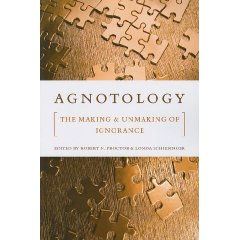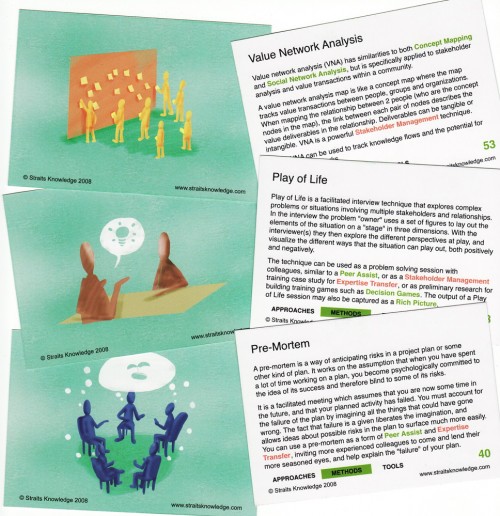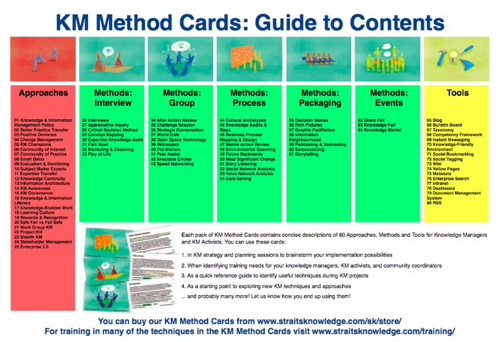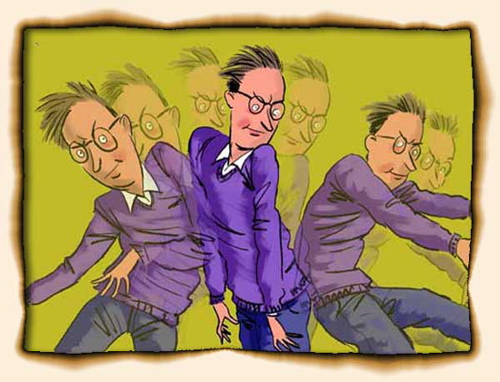Jul 03
Why Knowledge Doesn’t Move
Back in April iKMS hosted a talk by Professor Gabriel Szulanski of INSEAD on his fascinating research into knowledge “stickiness” – ie the factors that inhibit knowledge transfer. It was a great talk and here it is in podcast form.
PART TWO: BARRIERS AND SOME SOLUTIONS
Professor Szulanski’s slides for the talk can be downloaded here. And the book is here!
Jul 03
Blowing up the Pyramid
That bloody DIK pyramid gets my goat every time. It was used far more than is good for my blood pressure at a conference in Kuala Lumpur this week. It is pervasive and nasty. Martin Fricke has published a rigourous theoretical paper (from the perspective of information science, not explicitly KM) showing exactly why the DIKW pyramid is not only wrong, but also misleading. It generates poor understandings of the relationships between data, information and knowledge, and this in turn leads to poor methodological practices. This observation in particular struck a chord:
“The DIKW theory also seems to encourage uninspired methodology. The view is that data, existing data that has been collected, is promoted to information and that information answers questions. This encourages the mindless and meaningless collection of data in the hope that one day it will be ascend to information—pre-emptive acquisition.”
Fricke cites a hilarious example of the kind of things we can learn from such practices – did you know that Librans tend to break their hips?
While every assault on the pyramid is welcome in my book, it’s a shame that the issue wasn’t addressed as well from the knowledge perspective (ie data is a designed knowledge artefact, not a primitive of information), and that the ludicrousness of the framework will only become obvious to the relatively few people in KM (my guess) who read the Journal of Information Science. Thanks to Margaret Gross via the TaxoCop community for this link.

Jun 27
Playing Games
Matt Moore has a hilarious post on our new KM Method Cards – if you want to know how to play KM Strip Poker or KM Tarot, go visit!
Cory Banks sees other uses closer to what we’d originally anticipated: “I see these not only as a learning tool to get people to understand KM better but a good way to cluster pieces around a challenge to find the right mix for one or more solutions.”
Jun 27
Manufacturing Ignorance
This is an important book, focusing on ignorance not as a passive state of unknowing, but as a political and manipulated condition. I’m just getting into it, but it’s already making mental waves.

Jun 27
Curtain Call
Yes I’m biased towards sheep, but isn’t this a great sculpture? From Sydney’s harbourfront, just next to the convention centre. It’s called “curtain call”. I’ll be thinking of this when I next speak at a conference. Why don’t we do curtain calls at KM conferences?

Jun 17
KM Method Cards
Ok, they’re finally here! One of the reasons why I’ve been keeping my head down over the past few weeks has been our KM Method Cards project.
For the past few years now, we’ve been growing a set of concise summary cards covering KM approaches (eg CoPs, Information Literacy, KM Champions), methods (eg AARs, Pre-Mortems, Anecdote Circles) and tools (eg Wikis, Taxonomies, Competency Frameworks). We’ve used them in a variety of activities with our clients, often in helping them to visualise and plan how they are going to operationalise their KM strategies. Our clients have used them to provide quick reference guides to their KM activists and champions, and also to identify training and competency development needs. They’ve been so successful, that we finally decided to bite the bullet and produce a commercial version of them. And now they are here!
The graphic below gives you a sneak peek, and the Guide to Contents image below can be clicked to download the pdf of the overview guide. You can buy the KM Method Cards securely online using a credit card courtesy of Plimus, or by contacting us directly at (makes more sense for buyers in Singapore, if you want to save the postage costs by picking them up at our office).
Enjoy! Buy! (If you like the artwork, visit Joseph’s portfolio blog!)

Jun 16
Chicken Management
I sometimes wonder if this is how KM comes across to helpless civilians when we embark on our awareness and buy-in campaigns… Thanks to David Gurteen.
Jun 12
Getting Management Read-in
Picture this. You have been commissioned to conduct an audit of KM and IM related infrastructure within an organisation, and you’ve identified certain gaps and areas for improvement. Some of them relate to some information governance issues and risks. This is a complex area to explain so you write a 20 page report identifying the key findings, linking them to well known risks and existing good practice and standards around policy governance, records and information management, and making specific recommendations.
Because this is about governance and corporate risk, it needs to go to the senior management team. You have twenty minutes with them, so you compress your report into five slides that summarise your findings and recommendations, but you also send them the report in advance and ask them to read it. At the meeting, they have not read the report, they take issue with the colouring scheme on one of the slides, and do not accept some of the more important recommendations.
Issues around knowledge management, information management and records management do affect corporate performance, opportunity and risk. They are also often complex to explain (even on the best of powerpoint slides). We often talk about the importance of getting management buy-in for KM, but quite often, it’s not just buy-in we need. We need sufficient attention and comprehension from senior managers to tell us where their priorities are, to understand and respond appropriately to significant findings affecting their business, to make and understand the consequences of decisions. So it’s not just about getting management buy-in. A prior challenge is getting management to read and think.
But of course, Dilbert says all this much better than I can.
Jun 11
Wisdom Management Again
The June issue of Inside Knowledge carries the substance of my April post on wisdom management. Meanwhile, in a couple of recent comments on my April post, Steve Denning is doing what looks suspiciously like a bit of Artful Dodgering (thanks to Mike Reed).
Jun 09
AAR in Progress - Do Not Disturb
Last week we conducted a workshop for a client, teaching their staff some basic knowledge sharing tools and techniques. One of those techniques taught was After Action Review (AAR), and we got the participants to think about what could possibly go wrong during an AAR. One of the answers given was that given that AARs usually take place within the office building, there is always the possibility of AAR participants being called away to attend to other matters. One way to avoid that is to protect the AAR session, and this idea came and somehow stuck in my mind. Feel free to use it if you find it useful.



